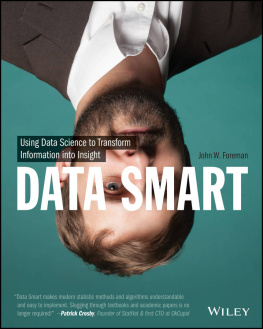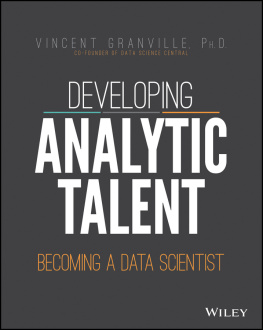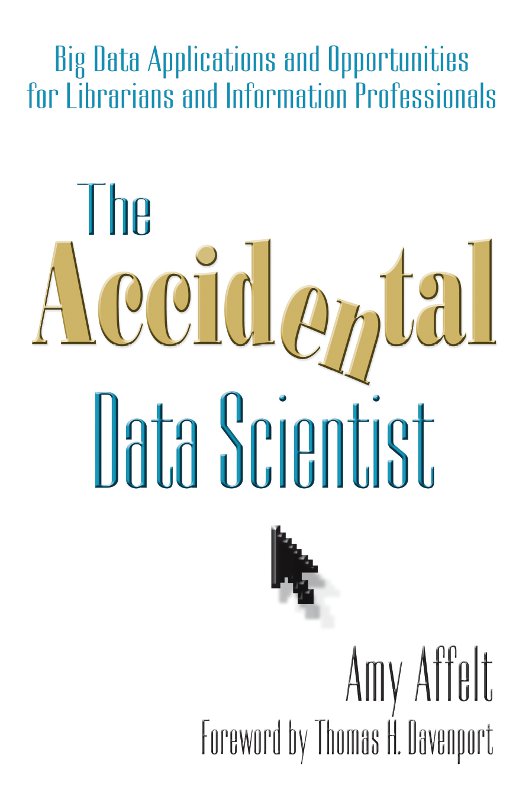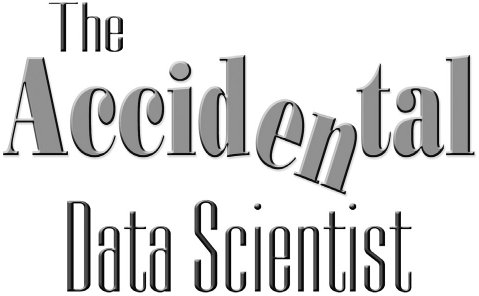Praise for The Accidental Data Scientist
A generation ago, librarians and information specialists could be forgiven for not knowing the ways that the internet would disrupt their institutions and their professional lives. They dont have that excuse today as they face the next revolutions in the emergence of Big Data and the Internet of Things. Amy Affelt has spelled out the implications here in a volume that is as practical as it is wise.
Lee Rainie, Director, Pew Research Center Internet Project
If youre a librarian or information scientist, this book will introduce you to the key concepts and terminology you need to understand Big Data.
Daniel Tunkelang, Head of Search Quality, LinkedIn
A practical, easy-to-understand guide that lets librarians and information professionals leverage their transferable skills into Big Data knowledge and become expert guides on a career path that promises to be hot for years to come.
Deborah Hunt, Past President, Special Libraries Association, and Director, Mechanics Institute Library
Librarians skills, values, and knowledge around information management make us the perfect fit for the needs of the Big Data movement. Amy Affelts timely book shows the how and why for librarians in an interesting and understandable way.
Bonnie Tijerina, Fellow, Data and Society Research Institute
A much-needed call to action to ensure that librarians retain their essential role as guides, curators, and knowledgeable experts as every aspect of our lives becomes increasingly data driven. I highly recommend this book as essential reading for anyone about to jump down the Big Data rabbit hole!
Rick Smolan, co-creator, The Human Face of Big Data
A pressing call to action for librarians to engage with Big Data. The rich sources Affelt draws upon enrich and expand our understanding of the world of Big Data and how we, as information professionals, can play an important role in a world of exponentially increasing amounts and varieties of data.
Kathryn J. Deiss, Content Strategist, Association of College & Research Libraries, American Library Association
Part librarian manifesto, part how-to guide, The Accidental Data Scientist makes the convincing case that librarians have been playing many critical roles expected of the modern and much-hyped data scientist, emphasizing the often undervalued importance of data verification and data integrity.
Dr. Cathy ONeil, Director, The Lede Program, Columbia University Graduate School of Journalism; data scientist, author, and daily blogger at mathbabe.org
First Printing
The Accidental Data Scientist
Copyright 2015 by Amy Affelt
All rights reserved. No part of this book may be reproduced in any form or by any electronic or mechanical means, including information storage and retrieval systems, without permission in writing from the publisher, except by a reviewer, who may quote brief passages in a review. Published by Information Today, Inc., 143 Old Marlton Pike, Medford, NJ 08055.
Publishers Note: The author and publisher have taken care in the preparation of this book but make no expressed or implied warranty of any kind and assume no responsibility for errors or omissions. No liability is assumed for incidental or consequential damages in connection with or arising out of the use of the information or programs contained herein.
Many of the designations used by manufacturers and sellers to distinguish their products are claimed as trademarks. Where those designations appear in this book and Information Today, Inc., was aware of a trademark claim, the designations have been printed with initial capital letters.
The views and opinions expressed in this book are the authors and do not necessarily reflect the views or opinions of her employer or the publisher.
Library of Congress Cataloging-in-Publication Data
Affelt, Amy L., 1970
The accidental data scientist : big data applications and opportunities for librarians and information professionals / by Amy L. Affelt.
pages cm
Includes bibliographical references and index.
ISBN 978-1-57387-511-0
1. Librarians--Effect of technological innovations on. 2. Library science--Vocational guidance. 3. Information science--Vocational guidance. 4. Big data. 5. Data libraries. 6. Database searching. 7. Electronic information resource literacy. I. Title.
Z682.35.T43A38 2015
020.23--dc23
2014037859
Printed and bound in the United States of America
President and CEO: Thomas H. Hogan, Sr.
Editor-in-Chief and Publisher: John B. Bryans
Project Editor: Theresa Cramer
Associate Editor: Beverly Michaels
Production Manager: Norma Neimeister
Book Designer: Jennifer Burmood
Cover Designer: Ashlee Caruolo
www.infotoday.com
For my father, Gerald, my mother, Carol,
and my husband, Michael
A couple of decades ago, Larry Prusaka librarian by backgroundand I wrote an article called Blow Up the Corporate Library. (If you are the intended reader of this book, Im sure you can find it easily.) At the time, Larry and I were just beginning to shape our thoughts on the emerging discipline of knowledge management. We felt that librarianssubstitute information professionals, if you prefer, or even information scientistsdeserved to play an important role in this phenomenon, but were in danger of being left behind. We argued that the standard librarianship model was too narrow for its practitioners to succeed in this new context.
I am pleased to see that Amy Affelt has taken a similar approach in The Accidental Data Scientist. She argues that data science should be just as much the province of information professionals as knowledge management was. She also provides a great deal of her own knowledge and wisdom that will be useful to information professionals in repackaging themselves as data scientists and big data specialists.
While the term repackaging may seem objectionable to some who are proud of their library heritage, I would argue that it is essential in the current age. I have always loved libraries and librarians, but to me the terms reek of quaintness and irrelevance. Just as I love printed books but still made the switch to Kindle and iPad-based reading, I believe that librarians should abandon that term and move to one of those Ive already mentioned. Affelt comes to a somewhat different conclusion when she discusses the terminology of the field in this book, but acknowledges that it has been an important debate for many years.
There is a lot of precedent for this repackaging, at both the institutional and individual level. Let me give you an example of each. I recently visited the School of Information at the University of California at Berkeley. Like several other schools that were once focused on training and certifying librarians, that institution has done a remarkable job of repackaging itself over time. I gave a talk there on Big Data in Big Companies, and big data is a key focus of the school. One of its newest degree programs, for example, is a Masters of Information and Data Science, a fully online degree known in shorthand as datascience@berkeley. This focus of the school marks a big change from its start as a separate school in 1926 as the School of Librarianship. In 1976 it became the School of Library and Information Studies, and in 1994 it became the School of Information Management and Systems. In 2006 it became simply the Berkeley School of Information.


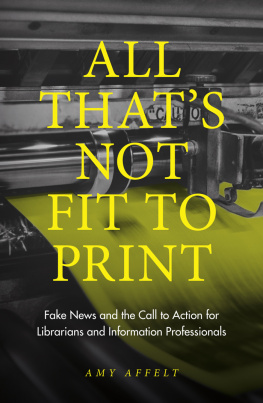
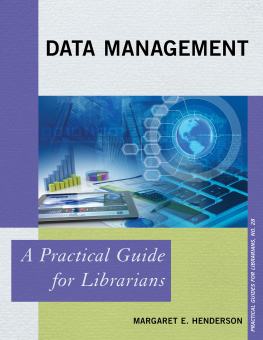
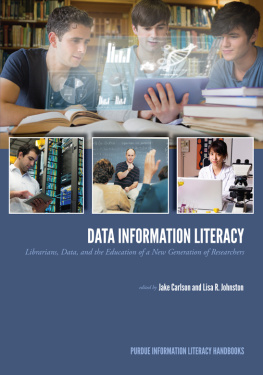
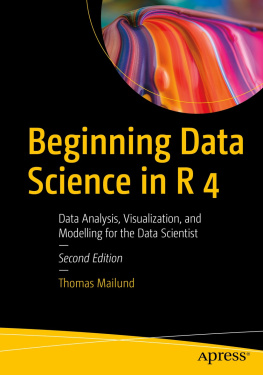
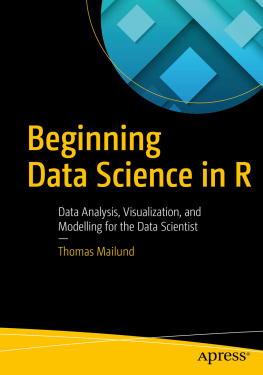
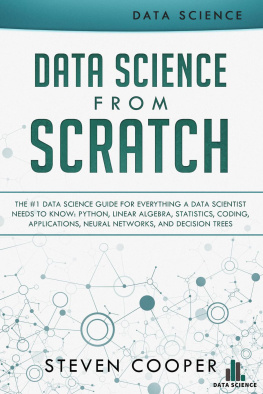
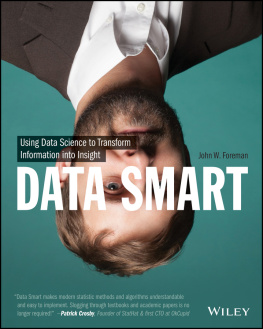
![Thomas Mailund [Thomas Mailund] - Beginning Data Science in R: Data Analysis, Visualization, and Modelling for the Data Scientist](/uploads/posts/book/119629/thumbs/thomas-mailund-thomas-mailund-beginning-data.jpg)
![Brian Godsey [Brian Godsey] - Think Like a Data Scientist: Tackle the data science process step-by-step](/uploads/posts/book/119618/thumbs/brian-godsey-brian-godsey-think-like-a-data.jpg)
